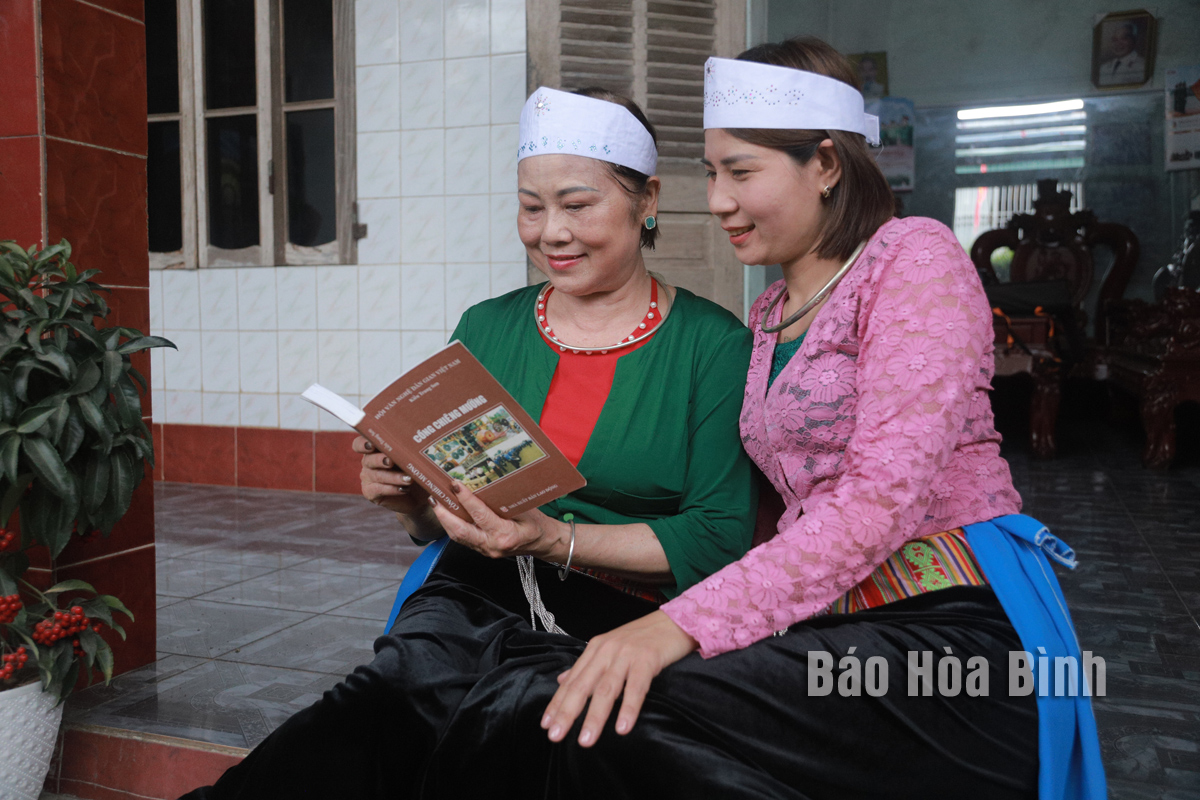
Born and growing in the heroic land of Muong Dong, Dinh Thi Kieu Dung, a resident in Bo town of Kim Boi district, in her childhood was nurtured by the sweet lullabies of her grandmother and mother. These melodies deeply imprinted on her soul, becoming an inseparable part of her love for her ethnic group's culture. For over 20 years, this love for her hometown has driven Dung to research, collect, and pass down the cultural values of the Muong people to future generations.
Dinh Thi Kieu Dung, a resident in Bo town of Kim Boi district, teaches the Muong culture to the younger generation.
Dung shared: "Growing up, I often self-studied and took notes on folk verses, traditional rhymes, and the old gong songs of our ancestors. During my time working in the cultural sector, I pursued my dream of breathing life into the Muong culture so it would continue to shine. I frequently visited hamlets and met with the elders there to collect ancient gong songs and folk melodies passed down from our forefathers. I always uphold a strong sense of responsibility in studying and following the ideology, moral example, and style of President Ho Chi Minh, contributing my small part to the preservation and promotion of our ethnic cultural identity in an era of integration when these values risk fading away.”
Dung added that the gongs form a vital part of the Muong spirit – a "sacred treasure”. Its sound is the voice of the Muong soul, the voice of mountains, forests, and streams harmonising with the daily life of local people. To preserve and ring into play the intangible cultural value of the Muong gongs, she has taught gong-playing skills to culture cadres and grassroots art teams.
While working in the district's cultural sector, Dung was an energetic and dedicated civil servant who excellently fulfilled her duties. With her passion for the profession and respect for the Muong ethnic culture, especially folk singing and gongs, she trained 14 gong teams with over 200 artisans in the district and neighbouring areas. Since 2004, her classes have taught more than 500 people the basics of playing gongs and singing Muong folk songs.
After retiring in 2016, she has devoted much of her time to voluntarily teaching gong playing and folk singing skills to children aged 8 to 15. She believes that passing down culture to the young not only helps preserve the ethnic identity but also enhance connectivity between generations.
During her teaching, Dung has selected promising students for further training and prepared them to perform at cultural exchanges and local festivals. She has also compiled two books on the Muong folk melodies and the art of gong playing of the Muong Dong people in efforts to maintain the beautiful cultural heritage of the ethnic group for future generations.
Bui Van Dat, Vice Chairman of the Bo town People’s Committee, said that Dung is a shining example who actively promotes and encourages the local community to adhere to the Party’s policies and the State’s laws, and build a great national unity bloc. She is also a typical role model in studying and following the ideology, moral example, and style of President Ho Chi Minh. Her dedication has helped preserve and promote the ethnic group's values and also contributed to local socio-economic development.
The Truong Kha temple festival, a distinctive cultural event held every three years in Vu Ban township, Lac Son district, returned recently with vibrant rituals and folk traditions of the Muong people. Located next to the Buoi River in the Muong Trao fields, the Truong Kha Temple is dedicated to the three Kun Dol deities, revered for teaching farming techniques, irrigation, weaving, and protecting the harvest.
The demand for spaces serving community activities of residents in various areas across Hoa Binh city has been satisfied as local cultural houses now feature modern, spacious facilities thanks to the effective implementation of Resolution No. 49/NQ-HDND issued on December 28, 2021 by the city People's Council, which approved the plan for reorganising, converting, and allocating land for the construction, repair, and expansion of cultural houses in Hoa Binh’s villages and residential areas until 2025.
At the end of May, the Hoa Binh Provincial Ethnic Arts Troupe organized a series of performances for residents in Region 2 and Region 3 communes across the province. Bringing art to ethnic communities in remote, isolated, and especially disadvantaged areas has become a meaningful activity. These are not merely artistic performances but also journeys to disseminate cultural values, enrich spiritual life, and contribute to preserving the cultural identity of ethnic minorities.
In recent years, alongside the development of a tourism-oriented economy, the traditional brocade weaving craft of the Mong people in Pa Co Commune, Mai Chau district has been gradually preserved and promoted. It has become a unique indigenous cultural feature, contributing to improving the livelihoods of the ethnic minority community.
Hop Tien commune, Kim Boi district, Hoa Binh province is home to nearly 1,260 households with a population of over 5,700 people, 98% of whom are of the Muong ethnic group. Besides economic development, the commune places special emphasis on preserving and promoting the cultural identity of the Muong people.
Nestled in the pristine landscapes of Cao Son commune, Da Bac district, Sung hamlet has become a community-based tourism destination known not only for its natural beauty but also for its centuries-old traditional craft - the making of do (poonah) paper by the Dao Tien ethnic group. More than just a utilitarian product, do paper serves as a vital cultural symbol of the community.



